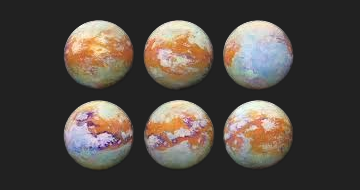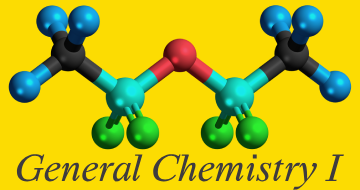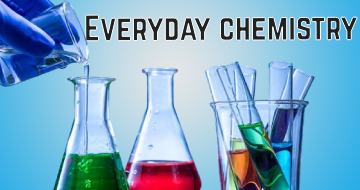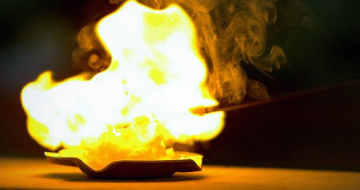IIRF Online > Teaching & Academics > Science > Chemistry > Become A Chemistry 1 Master - Basic Principles Of Chemistry
Become A Chemistry 1 Master - Basic Principles Of Chemistry by Udemy
A comprehensive course in basic fundamental concepts of Chemistry that covers everything for future exams in Chemistry.
Course Highlights
- Know exactly what is Matter, Element and Compound.
- Learn the scientific methods and type of Mixtures.
- Know the Three State of Maters and Units of Measurements.
- Calculate Scientific Notation and Significant Figures.
- Determine if the results you obtained are Accurate and Precise.
- Understand the Units and Dimensional Analysis.
- Understand the Atomic Theory and Models of the Atom.
- know the Law of Conservation and law of Multiple Proportions.
- Learn Atomic Mass, Mass Number and Isotopes.
- Know how elements are organized in the Periodic Table.
- Learn how to name the Ionic Compounds.
- Know how to write Chemical equations.
- Learn how to make a Chemical Balance.
- Understand The Mole Concept.
- Be able to do Mole calculations successfully.
- Learn determination of Chemical formulas.
- Understand the Stiochiometry.
- To calculate the Limiting Reactant and the Yield of the reaction.
- Study all the Solubility Rules
- Understand the Electrolyte and Non-Electrolyte solutions
- Know all the Types of Chemical Reactions
- Be able to do Calculations on Molar Concentration and Dilution Analysis
- Understand the Gravimetric Analysis and the Titration
- Understand Boyle’s Law, Charles’s Law, Gay-Lussac’s Law, Avogadro’s Law, Combined Gas Law, The Ideal Gas Law, Real Gases, Gas Density and Gas Stoichiometry.
- You will understand Thermochemistry the study of heat change in chemical reactions.
- You will be able to distinguish between Exothermic & Endothermic reactions.
- You will learn Enthalpy and the First Law of Thermodynamics.
- You will be able to calculate Heat Capacity (C) for any element.
- Learn how to calculate standard enthalpy of reaction (ΔH0) for any chemical reaction.
- You will understand the Properties of Waves.
- You will know how Bohr’s Model of the Atom works.
- Understand Schrodinger Wave Equation.
- Be able to find the four quantum numbers in Schrodinger Equation.
- You will be bale to write the Electron configuration for any element.
- Understand the Ground State Electron Configurations and Classification of Elements.
- know the Electron Configurations of Cations and Anions.
- You will learn The Atomic Radius, The Ionization Energy, Effective nuclear charge (Zeff) and The Electron Affinity.
- You will be able to understand Groups Elements Properties.
- You will be able to understand the difference between ionic bond and covalent bond.
- You will understand electronegativity and formal charge.
- You will be able to write Lewis structure.
- You will understand the VSEPR theory.
- You will understand the Hybridization.
Skills you will learn!
Curriculum
4 Topics
Contents of This Course - Promotional Video
Welcome - About Me
Contents of The Course
Your Honest Review !!!
20 Topics
Contents of This Section
Introduction to Chemistry
Methods of Science
Categories of Science
Steps of Scientific Method
Theory and Law
Matter Element and Compound
Types of Mixtures
QUIZ - Elements Compounds and Mixtures
The Three States of Matter
Properties and Changes of Matter
QUIZ - Properties and Changes of Matter
Units of Measurement
Scientific Notation
QUIZ - Scientific Notation
Significant Figures
QUIZ - Significant Figures
Accuracy And Precession
Units and Dimensional Analysis
Summary For This Section
29 Topics
Contents of The Section
Dalton's Atomic Theory
Atomic Symbols and Models
Law of Conservation of Mass
Law of Multiple Proportions
The Structure of The Atom
Discovery of The Electron
The Nuclear Model of The Atom
Atomic Number Mass Number and Isotopes
Mass Number and Atomic mass
Metals Nonmetals and Metalloids
Periodic Table of The Elements
Periodic table Copy
QUIZ - Periodic Table of The Elements
Molecular Substances
Ionic Substances
Organic Compounds
Ionic Compounds
Rules for predicting the charge for mono-atomic ions
Naming of Ionic Compounds Chemical Nomenclature
QUIZ - Naming an Ionic Compound from Its Formula
Formula of Ionic Compounds
Naming of Binary Molecular Compounds
Acids and Corresponding Anions
Naming of Hydrates
Writing Chemical Equations
Balancing Chemical Equations
QUIZ - Balancing Chemical Equations
Summary For This Section
16 Topics
Contents of The Section
Introduction to Calculations in Chemistry
Mass and Moles of Substance
Molecular Mass and Formula Mass
The Mole Concept
Mole Calculations
QUIZ - Mole Calculation
Determining Chemical Formulas
Quiz - Calculate the percentage composition
Elemental Analysis Percentage of C H and O
Determining Formulas
Molecular Formula from Empirical Formula
Stoichiometry: Quantitative Relations in Chemical Reactions
Limiting Reactant
Quiz - Limiting Reactants
Theoretical Yield
14 Topics
Introduction to Chemical Reaction
Ionic Theory of Solutions and Solubility Rules
Electrolytes and Non-Electrolytes
Quiz – Classification of Solutes in Aqueous Solution:
Solubility Rules
Quiz – Solubility Rules for Ionic Compounds
Molecular and Ionic Equations
Acid base Neutralization and Oxidation reactions
Quiz - Types of Oxidation-Reduction Reactions
Types of Oxidation-Reduction Reactions
Oxidation number
Quiz - Oxidation Numbers
Working with solutions
Quantitative Analysis
19 Topics
The Gaseous State
Gas Pressure and Its Measurement
Boyle’s Law: Relating Volume and Pressure
Quiz - Boyle’s Law
Charles’s Law: Relating Volume and Temperature
Quiz - Charles's law
Gay-Lussac’s Law : Relating Pressure and Temperature
Quiz - Gay-Lussac's
Combined Gas Law : Relating Pressure Temperature and Volume
Quiz - Combined Gas Law
Avogadro’s Law: Relating Volume and Amount
The Ideal Gas Law
Quiz - The Ideal Gas Law
Standard Temperature and Pressure (STP)
Gas Density; Molecular-Mass Determination
Gas Stoichiometry
Quiz - Gas Stoichiometry
Gas Mixtures; Law of Partial Pressures
Real Gases
8 Topics
Introduction to Thermochemistry
Quiz - Exothermic and Endothermic
Thermodynamics
Quiz - Enthalpy
Thermodynamic Equations
Heat Capacity (C)
Standard Enthalpy of Formation (ΔH formation)
Quiz - Hess law
8 Topics
Properties of Waves
Quiz - Properties of waves
Bohr’s Model of the Atom
Quiz - Bohr’s Model
Schrodinger Wave Equation
Aufbau principle and Hund's Rule
Electron configuration
Quiz - Electron Configurations
11 Topics
Ground State Electron Configurations and Classification of Elements
Electron Configurations of Cations and Anions
Quiz - Electron Configurations of Cations and Anions
Effective nuclear charge (Zeff)
Atomic Radius
Quiz - The Atomic Radius
Ionization Energy
Quiz - Ionization energy
Electron Affinity
Atomic Properties and Periodic Trends Attachment
Groups Elements Properties
7 Topics
The Ionic and Covalent Bonding
Electronegativity and Polar Covalent Bond
Quiz - Covalent bonds Ionic bonds and Polar covalent bonds
Writing Lewis Structures
Formal Charge
Formal Charge Summary - Attachment
Quiz - Formal Charge (FC)
6 Topics
Valence shell electron pair repulsion (VSEPR) model)
Molecular Geometry Attachment
Determining Molecular Geometry from Lewis Structure - Attachment
Dipole Moments and Polar Molecules
Valence Bond Theory
Hybridization
1 Topic
Get All My Courses with 95% Discount!!!

Become A Chemistry 1 Master - Basic Principles Of Chemistry








